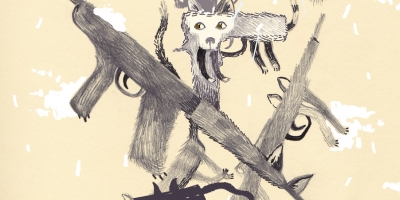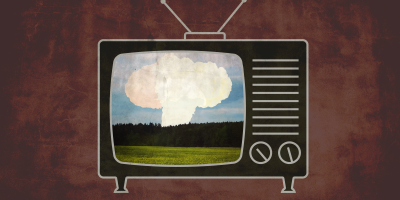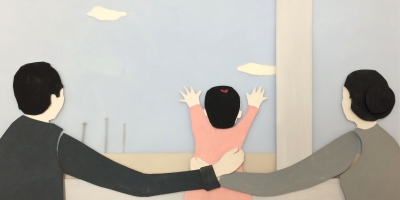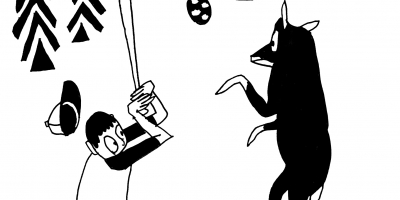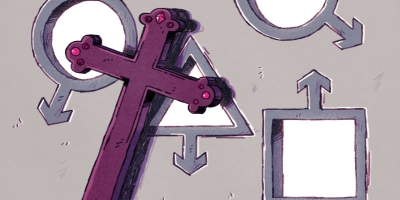In Conversation with
Emily Bell
by Callie Collins
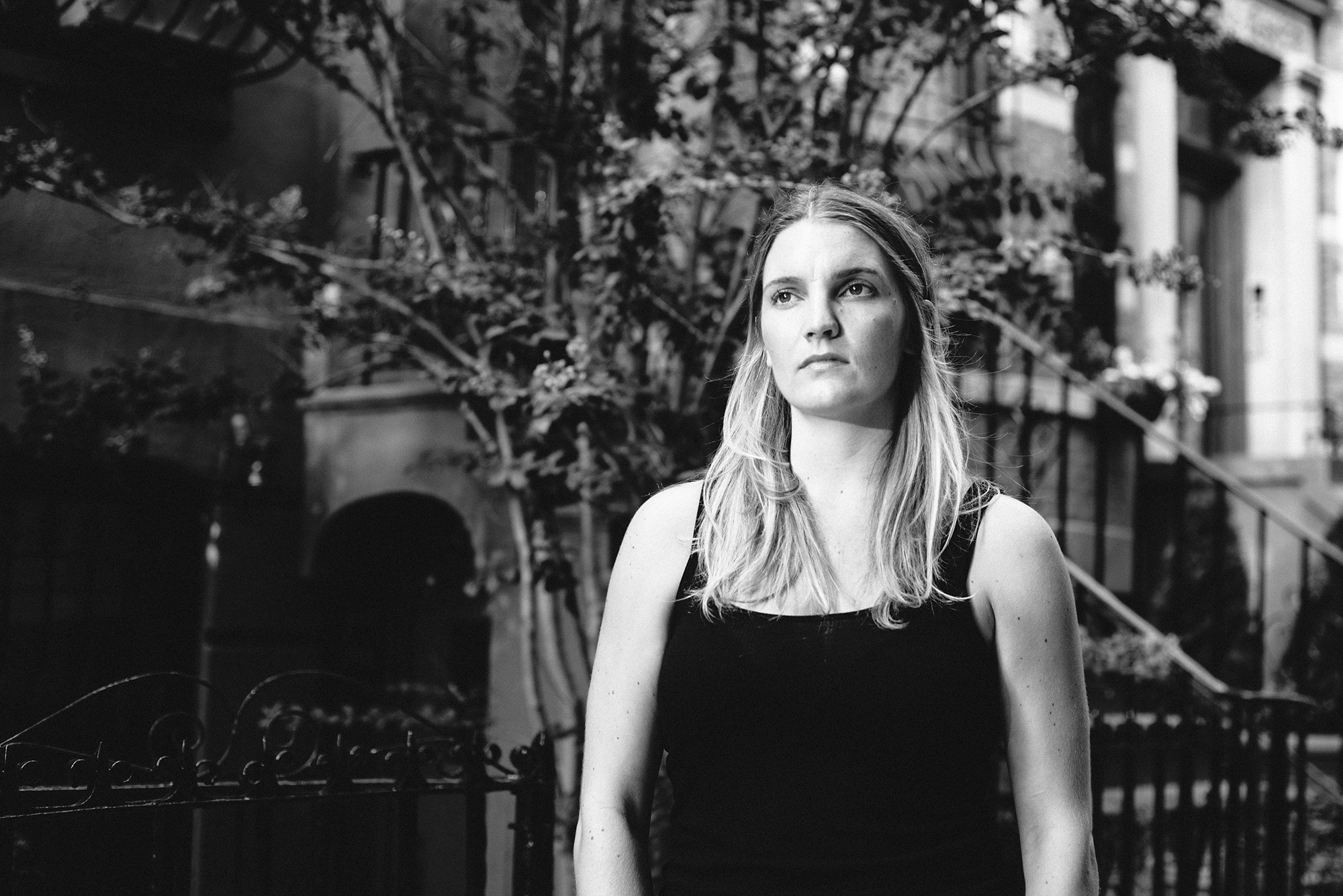
Sometime late last year, I had a funny realization. I was in the middle of Catherine Lacey’s brilliant, thrumming Nobody Is Ever Missing. It’s a risky book. It asks the reader to follow a woman out of her comfortable life and to New Zealand alone, and to connect with her brain, a brain that often struggles to land long enough to pick up passengers. I was hypnotized.
Much of the work I’ve loved in the past couple of years has swept me up like Lacey’s—into spectacular language; dark, riotous circumstance; and a particularly female, and unapologetic, strangeness. Books like this—read: Amelia Gray’s Threats, Laura van den Berg’s The Isle of Youth, Lindsay Hunter’s Don’t Kiss Me—burn a little brighter than other work coming out of major houses. They’re reckless and unflinching. And here’s the thing: look at their spines. The colophon is the same: FSG. And in the acknowledgments they so often rave about one editor: Emily Bell. It’s a good time for weird women in contemporary fiction. And that’s due in large part to Emily.
Emily started FSG Originals with Sean McDonald in 2011, and has built the imprint into a veritable force. She has singular taste, and she’s also known across the board to be an astoundingly intuitive editor. In interviews, her writers rave about her ability to get into their minds, to see their projects freshly and clearly. I met her for the first time at AWP Minneapolis in April, and had my suspicions confirmed—she’s just a badass.
When Rebecca asked me if I’d like to contribute to the anniversary issue of Midnight Breakfast, it seemed fitting to do an interview. I codirect a small press in Austin and was fascinated by Emily’s work—I wanted to hear about how she finds and finesses and advocates for the work she loves. And then the week before our conversation, she bought the debut novel by Kelly Luce, the author of A Strange Object’s first book. It felt serendipitous.
We talked on the phone about her writers, how she connects with a voice, what it’s like to fight for weird work inside of a major house, stalking new talent, fighting the boring, and motorcycles.
Callie Collins: I want to start at the beginning. You’ve said in the past that you aren’t someone who always knew you’d be an editor, but that you instead knew you loved being around people who took risks, who had scary talent. Tell me about how you landed at FSG.
Emily Bell: I grew up in the Bay Area; we lived in Berkeley, though mostly in Marin, and moved to the city when I was in high school. So I’m a California girl through and through. I went to college in Chicago and did my first year at a small school called Lake Forest College, and then transferred to the University of Chicago because Lake Forest wasn’t really my cup of tea. I went to a very competitive high school and really resented it, and I was looking forward to a more normal college experience. And then I got to the normal college experience and realized I wanted something a little more academically rigorous, especially given how much college costs.
It was a lot of work, but it was really inspiring being around brilliant people. That was something that I learned to love and feed off of, and I think that love informed why I went into the kind of publishing I’m in.
I knew I didn’t want to be a writer, but I thought I might want to work with writers and with brilliant minds who changed the way I thought about the world. I studied English, though my major was called Interdisciplinary Studies in the Humanities. (Just ’cause I didn’t want to write my thesis in the English Department, ’cause it was kind of stuffy.) I ended up writing on women and humor in the media, on humor as a tool of power and why men didn’t want women to be funny. And that’s definitely a theme in the kind of work I publish now—powerful, darkly funny, mostly female writers. But not all. I recently signed up a couple guys and some of my lady writers were like, “You did what?!” I said, “It’s okay. They’re cool, I promise.”
Collins: Oh, man. Dark, scary, funny women—makes me think of Amelia Gray immediately.
Bell: Yeah, Amelia’s my baby. Threats was the first book I published. I first read AM/PM when I had barely been in publishing at all—I read it and I thought, Whoa, this is so different than anything I’ve ever read, and I’m obsessed with it. And if I was going to keep doing this very nerdy thing, I was at least going to do it in the most badass way possible, and Amelia represented that to me.
So I wrote to her and pretended like I knew way more about publishing than I did and had much more agency than I did. I asked her if she was working on a novel, because that’s the question you’re supposed to ask, and she said yes, which was kind of a lie, and we just started talking, and she came to town for a reading, and we started hanging out, and she started sending me her stuff. I was at Riverhead at the time, and then my boss, Sean McDonald, moved over to FSG. He brought me with him as his assistant, and when I got to FSG we started FSG Originals together. It was the perfect place to publish Threats—that book really helped set the tone for what the Originals series was going to be. The imprint was sort of an experiment at first, but it quickly grew into its own proper identity. It’s awesome that Amelia was at the very beginning of that.
Collins: Do you feel like you ever face any resistance at FSG because you take on strange work? Or have you found an environment that’s really conducive to the books you love? Do you and Sean come up against any pushback?
Bell: You know, almost never. I don’t think they always understand exactly what it is we’re doing, or even like what it is we’re doing, but they’ve been very supportive. The experiment turned into something we’re excited about. We hope other people are excited about it, too.
Collins: Oh, I think they definitely are! I want to talk about a couple other writers of yours, but first I want to ask you: What are you looking for when a manuscript comes across your desk? And how fast do you know if a book is an FSG book, if it’s something you want to take on?
Bell: I feel like I have preoccupations that I’ve developed just by living in the world; that is: what’s kind of brewing in the back of my mind, what I’m noticing is going on, both interpersonally and in society. It’s never deliberate. It’s never like, I want to publish a gay book, or I want to publish a book about race, or I want to publish unlikeable female narrators! But I pay attention to what it is that I’m seeing and thinking about and talking about with friends. And I watch a lot of TV and a lot of movies, and so conceptually that’s where I find the work I want to publish.
But ultimately the most important thing to me is the writing. That it’s unlike pretty much anything I’ve ever read before. And it’s usually funny. Not everything I publish is funny, but I think that this world is so fucked up that there’s so much room to laugh about the sadness and the darkness and the fact that we’re all going to die. It’s pretty funny to me! Some people get real, real worried about it, but I just think it’s pretty funny. That has to come through in the writing within the first, say, twenty pages of a manuscript. Though I’d say that within three or four pages, I know whether I’m going to be interested or not.
Also, a lot of the writers I sign up I’ve been tracking for a while. I’ve known them for a while. Kelly Luce, for example, I knew. I read the book you guys published—
Collins: Yes!
Bell: I read that and I was like, I’ve got to publish this lady as soon as possible. So I sort of stalked her. I’d email her and say, “How’s it going?” and she’d say, “You’re annoying.” And then all of these submissions from agents were coming across my desk and I’d think, This is cool, but it’s not as good as what I know Kelly Luce is about to do, so I’ll wait.
I wait for the best stuff. Because it’s a lot of work, and you’d better be head over heels in love with your books, especially when you’re publishing literary fiction. In literary fiction you have to be pretty true to your taste, or it can get diluted very fast.
Collins: I love the idea that you’re kind of scouting and following up on people and chasing them down. Where else do you find your writers? Magazines? Are there agents you really trust?
Bell: I don’t rely on magazines, because a lot of people are scouting through magazines. There are some I really enjoy, but I know that anyone I read there for the first time is already being hounded by a handful of very impressive people, a category I do not fall into, so I gotta get ’em earlier. I read small press books from—well, A Strange Object, and I love Featherproof Books. Zach Dodson doesn’t run it anymore, but he’s my homeboy. He’s from El Paso, Texas, which is where my family’s from, and we became friends after I started publishing Amelia. I trust his taste implicitly; that’s where I also found Lindsay Hunter. I love what Two Dollar Radio does.
But now I get a lot of my writers via word of mouth. My current writers will tell me about someone, will say, “You’re gonna love this person.” I recently was in touch with Scott McClanahan, for example. He blurbed Lindsay Hunter’s book, and then he sent me his wife’s book. I hadn’t heard of her. I spend time on the internet, but I’m not involved in the alt-lit community online at all. So Scott’s wife, Juliet Escoria, is fucking awesome. I didn’t realize she’s been publishing stuff online for a long time, but he sent me her book and it just blew me away. She’s one of those people. I’m like, “Finish your next project! I’ll give you a tiny bit of money!”
So yes, at this point I find a lot of people through writers I trust. Unless they know me really well, though, it’s rare that they’re right on. There are a few people who always are, and those are the people whose recommendations I trust the most. In terms of agents: Katherine Fausset is my girl. And Claudia Ballard at WME is a good friend of mine; she’s got great taste, and she knows what to send me and what will definitely not be up my alley, which I really appreciate. Jim Rutman at Sterling Lord is great, and we’ve been friends forever. And Chris Parris-Lamb, he knows my taste too, which is nice.
Collins: I read all these interviews with your writers—I’m thinking particularly of Amelia and Lindsay, but also Laura van den Berg and Catherine Lacey, who I want to gush about in a minute—and in these interviews, they often talk about how in sync you are with them when you’re working on edits. I want to ask you a little bit about your process. What’s the first thing you do after you take a book? What do you think about first when you have a new manuscript?
Bell: My sort of stock answer, which is actually how I feel, is that my job is to help make the book the best version of what it already wants to be. So I try to inhabit that world. So often it’s a world that’s very different than my own, and that’s deliberate. I want to try to inhabit the world in the minds of people who are unlike me. I bore myself; I’m about as boring as it gets in real life.
So that’s sort of the entry point: inhabiting this world and figuring out how to make the characters and the story the best versions of themselves—the most compelling, the most honest. I ask my writers to be very, very honest, both in terms of character motivation and tone. I think that’s the biggest thing. When they talk about being in sync with me, that is. The voice is always the thing I respond to most, and it’s always the thing I think I can help with the most. Honesty and consistency in voice.
It’s hard, but it’s fun. And that part comes naturally. Though of course the actual work of editing is very hard and doesn’t come naturally, ’cause I’m a huge procrastinator. I’m sure they’ll all tell you that I’m always really late on edits.
Collins: Oh, we are too. We are too.
Bell: Across the board.
Collins: The voice thing leads nicely into talking about Nobody Is Ever Missing. That book destroyed me. I read it very, very quickly, and the voice is so particular and consuming and rhythmic. What was it like to encounter that voice for the first time?
Bell: That was an interesting one. Catherine’s book came in on submission to Eric Chinski, our editor in chief, and he started reading it and was like, “Oh! This is an Emily Bell book.” But he loved it too, and we ended up editing it together. It was really interesting having somebody else weighing in when I’m so used to just working with the writer. But Eric and I, our fiction sensibilities are pretty similar, so it worked out well.
I guess I responded to that book because it surprised me. I didn’t think I liked “stream of consciousness.” If you were to ask me before I worked on that book, I would have said, “It’s self-indulgent and irritating and goes nowhere.” But there’s something about Nobody is Ever Missing; she’d take two steps forward, one step back, two steps forward, one step back. And she did it so quickly; there was so much momentum. That idea of always having to backpedal felt so true to life that it really resonated with me. And this idea of having a seemingly lovely life and still wanting to rip your hair out and fly across the world—I mean, I have a very lovely life and a perfect husband, and I am desperately trying to buy a motorcycle right now. So that’s obviously something that is part of the human condition, if you’re at all in touch with what’s going on inside. That is there in all of us, and if you say it’s not, you’re lying. And Catherine Lacey does not lie.
Collins: She doesn’t. And that reminds me too of so many of Laura’s characters, this refusal of a traditional, happy life, for something more solitary and internal after having been abandoned in some way. And you’ve talked a little bit about how you tend toward women writers, and I have to say, when I think of FSG Originals, I think of these women—Amelia and Catherine and Lindsay and Laura. It seems to me that they together have kind of defined your list.
Bell: It hasn’t been deliberate or by design—it’s just what’s felt most compelling. Their work feels so immediate to me, and that immediacy—in art in general—is something that I’m really curious about and would like to remain engaged with as long as I possibly can.
Collins: I was thinking toward the end of last year about 2014 being this year of “strange women’s brains” in literary fiction. There was Jenny Offill—
Bell: I loved that book.
Collins: Oh, so good. And A Girl Is a Half-Formed Thing. All of these books coming out that were so internal and so true to weird women.
Bell: And unapologetically so. That is something that is really important to me. If I had to say that anything that I did was deliberate, it’d be that. The voices I publish, they’re not trying to please their readers. They’re not really concerned with that. They don’t really give a fuck. And the idea that they should is anti-intellectual to me; it’s kind of offensive. And it’s not why I work in books at all. If I’m going to have to pander to anyone, I’m going to make a whole lot more money than I do!
Collins: I’m really attached to that idea, the idea that literary fiction can challenge its readers, and that readers are smart enough and engaged enough to roll with you, to take those risks with you.
Bell: I love it too. I hope it’s true.
Collins: Can we go back to Kelly Luce? It makes me so, so happy that you took her novel. Will you tell me a little bit about it, and what it was like when you finally read it after scouting her for so long?
Bell: What’s fun about Kelly’s novel is that I knew I loved it, but I didn’t quite know why. It’s disturbing. I mean, almost everything I do is disturbing, but often it takes me a little while to put my finger on exactly why. And Kelly in particular is such a cryptic writer, and this character has had a deeply troubled childhood and is so emotionally unavailable. Yet you’re desperate to crack her. Part of the momentum throughout the book is like, Is this bitch gonna open up? I need a little bit, you know! I love that. I like people like that. I’m an oversharer, and so I try to surround myself with the opposite of that. I like characters like that—you’re so grateful when they give you even just a morsel of what’s going on in their brilliant brains.
And I’ve been to Japan—we went to Japan for our honeymoon—and it’s just the most beautiful, strangest place I’ve ever been to. It’s simultaneously so cool and so cheesy. And Kelly nails that when she’s writing about Japanese cultures and mores; that’s where a lot of the humor comes through. She’s never making fun of them, she’s just—to use the worst word in the world—she juxtaposes these kooky characters with this very serious, unflappable main character.
Collins: I want to switch gears a bit and talk about New York. When Jill and I do interviews, we get asked about Austin all the time because it’s small and “burgeoning,” but New York is kind of this whale. First: Do you feel like the scene in New York is kind of stagnant, or do you feel like it’s changing, evolving?
Bell: You know, I love New York. I think it’s the best city in the world. But I don’t think everybody needs to live in the best city in the world. And I actually think it’s creatively counterproductive for a lot of writers, because there is an event every single night you can go to; I think it can be so insular and so self-reinforcing in an unproductive, unattractive, uninteresting way. I would like to not live in New York, and I don’t think that my work would suffer from it.
Collins: Do you think you could do your work somewhere else?
Bell: Oh, one hundred percent. And I think I might even be better at it. But I don’t feed off of the New York scene the way I think some other people do. It’s just not my thing. If I were going to do something I thought was cool, I’d be working in fashion or movies. Book parties? Not that cool.
Collins: Let’s talk about the Originals Series, the reading series you started. I read this piece in the New York Observer that says you “found a cure for boring readings,” which really fascinates me, because I run a reading series in Austin, and I think a lot about how to put very literary work in front of people in new ways.
Bell: Yes, so, the first rule was: no reading. The only person we let read once was Lindsay Hunter, because if you’ve ever heard her read—
Collins: Yeah, Lindsay reading doesn’t count.
Bell: It’s not like reading. It was earlier on, toward the beginning of when we started doing the Originals, and we wanted to do something to make it more dynamic than just publishing books. We wanted a conversation. Sure, there are a lot of conversations on the internet, but it’s more fun when people talk about things in public. We wanted it to be different than the other events we’re kind of forced to go to in New York, so we decided we’d try to get musicians involved and have them in conversation on stage, and then have the musician play a few songs. And have an open bar. So it’s more like a party, with some ad hoc programming.
We’re sort of rethinking. We’ve had probably eight or nine, and now we have a model: Whenever we think, Oh, we’ve figured this thing out—that’s the exact moment we want to try something different. So now we’re trying to reconceive.
Collins: Yes to the idea of reimagining once you’re comfortable with something! I want to know what’s coming up for you, what you’re most excited about.
Bell: It’s not an Original, but I’m publishing a book by a writer named Lucia Berlin in August. It’s called A Manual for Cleaning Women. She passed away in 2004, and she wrote quite a bit in the ’60s, ’70s, and ’80s—all short stories. The book came in on submission, and the agent was Katherine Fausset, and she was like, “This is sort of strange; it’s a posthumous project,” and I started reading, and many of the stories take place in the Bay Area and in El Paso—
Collins: Oh, nice! Perfect.
Bell: Yeah, I thought, Oh, yeah, this book’s made for me. And as I got farther, even just into the first story, I was just like, Holy shit! This is so good! And it’s mindboggling that she hasn’t gotten the attention. She’s truly a lost, a forgotten classic, and my sincere hope is that she’ll get some of the readership she deserves, that she deserved while she was alive. Her books were originally published by Black Sparrow Press, a super-cool indie publisher who closed their doors around the year 2000. They published Charles Bukowski; they were just doing super-cool shit.
So that’s the thing coming up next I’m most excited about. Even though the stories were written so long ago, they are absolutely in conversation with the contemporary writers I’m publishing right now. It was really fun to have that experience when I was reading the stories initially—just knowing immediately that I was almost destined to publish these stories. And that’s how I feel about most of my books. Like: I can’t not do this. That’s the feeling I look for when I’m reading and considering something.
And then after that, in March, I’m publishing a novel. This is a funny story, I think. It’s this novel called Hurt People by a writer named Cote Smith. The book came in on submission to me over three years ago, and I read it then and I loved it, but I didn’t have the vision or the confidence at the time to publish it. But I never stopped thinking about it. I kept seeing movies or reading other things that reminded me of this novel, and I would always say to myself, Oh, this movie is trying to do the thing that that novel did so much better. It stayed with me. And at the end of last year, I really couldn’t stop thinking about it, and I asked the agent if she’d sold it—and I knew the answer was no—and I said, “Let me look at that again,” which meant: I’m going to buy this. I’m ready to do this now.
And it’s fucking awesome. It was interesting because it definitely needed some work, but it was such a pleasure working with him. We were on the same wavelength. And the edits I gave him—it was remarkable how well he revised. It’s such a cool book, and it’s so impressive that it’s his first. I’m so excited about this book. I think he’s unbelievably talented and unbelievably patient! And you need to have that quality as a writer, I think.
I’ve always sort of trusted that the right projects will come at the right time. And trying to force anything has never worked for me. I can’t pretend to like something more than I do, even if and when (and often) I know it’ll sell for a lot of money and will sell a lot of copies. I’ve always trusted that instinct and it’s panned out pretty decently. I don’t know. I still don’t have a motorcycle yet.
